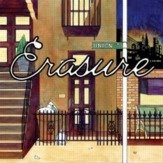 Genre: Acoustic
Genre: Acoustic
Released: April 18, 2006
Verdict: &&&&Synthpop stalwarts Erasure go all experimental (and arguably self-indulgent) on Union Street, replacing the customary blips, bleeps and thudding bass of their melodic pop tunes with pedal steel, dobro and acoustic bass on country/western-tinged interpretations of 11 songs from their impressive catalog. On the surface, this seems as unlikely as Britney Spears singing an album of arias, but diehards will have seen it coming in the earthier sound of 2000's underrated Loveboat and the increasing appearance of acoustic versions as b-sides and EP fodder. They've also shown signs of artistic restlessness, coming forth with a mixed-bag covers album and a solo album by vocalist Andy Bell in the recent 2000s.
The selection of arguably obscure album tracks and even a b-side on Union Street may limit the appeal to longtime fans, but anyone who enjoys an intimate, stripped-down sound could get roped in by the music and the emoting of Bell, who is unequalled among synthpop vocalists. Many of these songs are about pining for love or fulfillment, and the plaintive, twangy guitar magnifies the yearning in songs like "Boy," "Home" and "Piano Song," the 1989 Wild! album opener that works surprisingly well without the piano. It's a testament to Erasure's songwriting that these tunes fare so well outside their natural dance-pop habitat. While many of their albums are appropriate for a Saturday night soiree, this mature, charts-be-damned offering is the perfect complement to a lazy Sunday morning.// How you know them // Erasure had three U.S. top 40 hits: "Chains of Love," #12 in 1988; "A Little Respect," #14 in 1989; and "Always," #20 in 1994.// Linkage // Official site
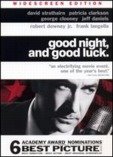 Genre: Drama, docudrama, politics, black and white
Genre: Drama, docudrama, politics, black and white
Director: George Clooney
DVD released: March 14, 2006
Verdict: &&&If anyone should have won an Oscar for George Clooney's quiet and thoughtful rendering of Edward R. Murrow vs. Joseph McCarthy in Good Night and Good Luck, it's David Strathairn, who, as Murrow, is more expressive sitting silently as smoke curls from the cigarette dangling between his fingers than many actors are in a movie's worth of dialogue. Television journalist Murrow took on the Communist witch-hunt of Sen. McCarthy, and the movie portrays the paranoia of the time and the behind-the-scenes turmoil at CBS news, all through an unending haze of cigarette smoke, lest we forget it's the '50s. While the crisp and attractive black-and-white images convey a sense that this is a world far removed from us in time, the movie illuminates how little, in some ways, things have changed: Murrow's speech about modern complacency that bookends the movie could be made today and no one would bat an eye, and the depiction of how big-money advertising can interfere with news fits modern times, as well. There's some dead weight in a subplot involving the romance of a couple of CBS staffers, though, and I was left with a feeling of "Is that it?" as the credits rolled.
 Genre: Game show
Genre: Game show
Logistics: GSN, 10:30 p.m. Central, weekdays
Verdict: &&&&Couch critics will be tempted to carve the knives over this one, but let's don't. For a network that told its core audience to go to hell in recent years with offerings like Extreme Dodgeball, documentaries about people like Tonya Harding and Arnold Schwarzenegger, and reruns of The Amazing Race, this signals a step back to reality (mercifully not The Amazing Race kind). Not only is it a traditional panel game show, but it also embraces its retro appeal in the graphics and attractive Password-influenced set, and it's the first new game show offering from the network in quite some time. It's a remake of the Goodson-Todman classic that was indebted to What's My Line? and originally ran for 15 years beginning in 1952. A panel of four celebrities asks a series of "yes" and "no" questions within the allotted time to try to zero in on the guest's secret, and it's more about the humor in getting there than it is the end result. In this version, you get a fair amount of "I can break pencils with my butt" and "My breasts dance to music" type secrets. Host Bil Dwyer is comfortable and capable at the helm, but the Z-list celebrity panel (Suzanne Westenhoefer, Frank DeCaro, Jermaine Taylor and Billy Bean, a former baseball player who is emerging as the best inquisitor) may not do much to pull in the average channel surfer. Nevertheless, it's a very watchable and often funny half hour, and it's no secret that the GSN schedule should be peppered with more low-budget originals such as this rather than the likes of dodgeball and off-topic documentaries.
•• UPDATE 5/26/06 •• With hindsight, this series gets bumped up a full medal. The celebrity panel may not be well known, but they are smart and witty and play the game well. Bill Dwyer is an engaging host, and the bonafide celebrity guest appearances (George Wendt, Phyllis Diller) have been a nice bonus. The way the set and music wallow in retro chic is icing on the cake.
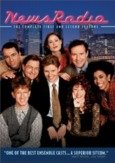 Genre: Sitcom
Genre: Sitcom
DVD released: May 24, 2005
Verdict: &&&1/2An episode of NewsRadio is one of the few things that can almost spark a pang of '90s nostalgia in my '80s-bred heart. It does spark a pang of nostalgia for NBC Must-See Thursdays – now definitely a thing of the past but once the most savory night of television. While attending Ole Miss from 1993 to 1995, I'd pop next door to Burger King to pick up some comfort food and then settle in for an evening of laughs with shows like Seinfeld, Frasier, Mad About You, Friends and this ensemble-cast gem, which ran from 1995 to 1999. Revisiting a well-crafted sitcom like NewsRadio, I can't help feeling that 95 percent of the sitcoms on television today wouldn't have lasted more than a few weeks even as recently as the mid-90s.
The cast had nary a weak link and was key to the show's success: the incomparable Phil Hartman as smug news reader Bill McNeal (what a shame to lose such a great talent in a senseless tragedy); Andy Dick as office spaz Matthew Brock; Stephen Root as goofy, wife-hunting station owner Jimmy James; and Khandi Alexander (later of CSI: Miami) as Hartman's saucy partner on the mic, Catherine Duke. The show was also a launching pad for Joe Rogan (electrician Joe), perhaps best known today for one of the greatest crimes ever perpetrated on the viewing public, Fear Factor, and Maura Tierney (reporter Lisa), who went on to E.R. Rounding out the bunch are Dave Foley as droll WNYX station manager Dave Nelson and Vicki Lewis as Beth the secretary.
The seven-episode first season is a little tighter overall than the second. Standout episodes in this set include "Smoking," in which Dave swears off caffeine to get Bill to stop smoking; "The Shrink," in which John Ritter appears as a counselor who brings out everyone's chatty, sensitive sides; "Presence," in which Jimmy loses Bill in a poker game; and an episode in which Bebe Neuwirth (Cheers) appears as a deranged temp. While the show skillfully balanced office and relationship humor with slapstick zaniness, Hartman's bombastic delivery consistently made the show, and his presence was sorely missed at the end.
// DVD notes // Twenty-nine episodes on three discs. Extras include outtakes from season two, episode commentaries and a featurette in which Hartman talks about trying out for the announcing gig on The Price Is Right before landing Saturday Night Live. Interesting to imagine how things would have been different had he, instead of Rod Roddy, got that job. He also said Bill McNeal's job is one he could imagine himself really doing had his career taken a different path.
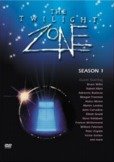 Genres: Anthology, creepy drama
Genres: Anthology, creepy drama
Director: Wes Craven, others
Verdict: &&&I get the feeling twist-loving director M. Night Shyamalan (The Sixth Sense, The Village) might have taken in some of these fun '80s Twilight Zone episodes back in the day. For someone who had grown up with shows like Dukes of Hazzard and Knight Rider, here was a wake-up call that there could be more to entertainment than talking cars, chase scenes, fisticuffs and explosions.
Though the quality is wildly uneven, it's worth enduring the bad to get to the good, and some viewers will marvel at the caliber of actors on display here: Bruce Willis, Morgan Freeman, Frances McDormand, Martin Landau and John Carradine are just a few of the big names. There's a novelty factor to this, as well: "Look! It's Geordi and Data from Star Trek: The Next Generation in the same episode!" And then there are the writers, including peerless talent like Harlan Ellison, Stephen King and Ray Bradbury. Trash novelist Sidney Sheldon manages a surprisingly good entry starring William Peterson (CSI) and McDormand (Fargo) in which people have got hold of the secret of life and whisper it into the ears of others, driving them stark raving mad.
Each hour-long episode typically includes two or three self-contained stories, a handful of which rely on a last-minute twist or sudden shift in the viewer's perception of what has transpired, such as "The Shadow Man," about a boy who discovers that a spooky figure comes out from under his bed at night and slinks around town. That's one of the three that I remember making a strong impression on me when I watched the show on CBS. Another is "A Message from Charity," in which a present-day teen is able to communicate with a girl in 1700 whose knowledge of the future gets her accused of being a witch. The third is "Button, Button," in which a couple (including a feisty Mare Winningham) receives a small box with a button that if pressed earns them $200,000, but the catch is someone they don't know will die. Some installments rely on a quirky novelty, such as "A Little Peace and Quiet," in which a fed-up housewife (or homemaker, as we tactfully put it in obituaries) while gardening digs up a medallion that gives her the power to freeze time. There's also some dark humor in stories like "The Uncle Devil Show," in which a children's video has kids wield black magic under the noses of oblivious parents. Ellison turns in some moving character pieces, including "One Life, Furnished in Early Poverty," in which a man transported back in time tries to offer advice to himself as a boy. A few monster episodes are gems, as well, including one in which a boy finds that an old man new to the neighborhood seems to be a vampire. For anyone interested in '80s television and dark themes, this is a pleasant way to pass some quality couch time. &&1/2 for the casual viewer and &&&1/2 for those who get a pang of nostalgia from this yields the &&& verdict.
// DVD notes // Twenty-four one-hour episodes from season one on CBS on six DVDs. Some episodes are presented in stereo, and some are in mono. Many feature exhaustive audio commentaries for the obsessed fan with members of the creative team, including Craven, Ellison, Philip DeGuere, Alan Brennert, Bradford May and others. In a brief interview, Wes Craven talks about the great mix of talent that went into the production and calls it one of the projects he's most proud of. A subsequent DVD set includes the later syndicated episodes.
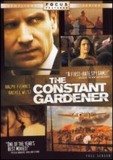 Genre: Drama/thriller
Genre: Drama/thriller
Director: Fernando Meirelles
Cast: Ralph Fiennes, Rachel Weisz, Danny Huston
DVD released: Jan. 10, 2006
Verdict: &&&&Expect nothing presented on a silver platter in The Constant Gardener, a challenging thriller based on a story by John LeCarré, a familiar name whose spy novels I've never tried. Before her death, Justin Quale (Fiennes) sees clues that his wife, Tessa, is involved in something scandalous she's hiding from him. After her death in Africa, he seeks to learn her secret and discovers a horrifying injustice involving government collusion with corrupt pharmaceutical makers who are taking advantage of a weak population. Anyone who gets in their way tends to turn up dead, and Justin finds himself threatened and even attacked. Everyone's motives and trustworthiness are uncertain. I didn't really buy the opening scenes, in which Tessa and Justin go straight from verbally sparring in a public forum to a stilted tryst. It doesn't take long to get drawn in, however, as the film smoothly shifts between past and present, weaving the back-story of Tessa's idealistic crusade into Justin's dangerous quest for the truth. The look of the movie is gritty yet beautiful thanks to the Kenyan setting. The themes of deception in marriage and medical abuse are strong, but I can see why this didn't make the shortlist for best picture: Smart and intriguing as it is, it certainly doesn't tug at the heart in the way some of the nominees do. // DVD notes // A decent assortment of deleted scenes. // Second-guessing Oscar // Nothing against Weisz, but her performance doesn't say "Oscar" to me. And, backtracking to Crash, how did its moving music not get nominated? But what do I know. I would have nominated Ian McDiarmid for best supporting actor for Revenge of the Sith.
 Genre: DramaDirector: Paul HaggisDVD released: Sept. 6, 2005Cast: Matt Dillon, Don Cheadle, Ryan Phillipe, Sandra BullockVerdict: &&&&1/2All the second-guessing about whether this or that film should have won the best picture Oscar aside, there's no denying that Crash has an emotional impact roughly equivalent to a 12-car pileup. It's an elaborate house of cards built with a tremendous cast of intersecting characters, and the rewards are many if you simply accept the cards as they're dealt rather than nitpicking whether the actions of some are too contrived. I love how the movie artfully and unselfconsciously tweaks the characters' and the viewers' expectations of behavior based on race. And this is no exercise in political correctness – there's plenty of bad behavior all around. It all unfolds in what is more a series of coincidentally connected events – a carjacking, the trashing of a store, a crash scene rescue – than a traditional plot. The essential point of the film is that we're all just people who need each other far more than we need the perceived differences between ourselves that humans are so hung up on. This point is crystallized in the crash rescue scene, one of the most poignant movie moments I've seen in years. By the time the movie reached its climactic scenes of urban madness played against Mark Isham's equally emotional score, I was blissfully wrecked.
Genre: DramaDirector: Paul HaggisDVD released: Sept. 6, 2005Cast: Matt Dillon, Don Cheadle, Ryan Phillipe, Sandra BullockVerdict: &&&&1/2All the second-guessing about whether this or that film should have won the best picture Oscar aside, there's no denying that Crash has an emotional impact roughly equivalent to a 12-car pileup. It's an elaborate house of cards built with a tremendous cast of intersecting characters, and the rewards are many if you simply accept the cards as they're dealt rather than nitpicking whether the actions of some are too contrived. I love how the movie artfully and unselfconsciously tweaks the characters' and the viewers' expectations of behavior based on race. And this is no exercise in political correctness – there's plenty of bad behavior all around. It all unfolds in what is more a series of coincidentally connected events – a carjacking, the trashing of a store, a crash scene rescue – than a traditional plot. The essential point of the film is that we're all just people who need each other far more than we need the perceived differences between ourselves that humans are so hung up on. This point is crystallized in the crash rescue scene, one of the most poignant movie moments I've seen in years. By the time the movie reached its climactic scenes of urban madness played against Mark Isham's equally emotional score, I was blissfully wrecked.
 Genre: Acoustic
Genre: Acoustic





